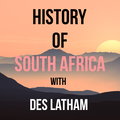
Episode 183 - Maqoma lectures lecherous missionary Brown and the pendulating Hermanus Matroos
Loading player...
Episode 183 it is, and we’re going to take stock as we enter 1851.
In war, truth is the first casualty. It’s a military maxim attributed to Aeschylus, the father of Greek tragedy. Aeschylus actually fought in the front lines against the Persians at Marathon in 490 BC.
We don’t know much about the rest of his life, but we do know that his work called 'Persians' which was financed by Pericles was such a success that he was invited to Sicily by Hieron of Syracuse to restage the play.
His life bridged the Archaic and Classical ages. Considered even by the ancients to be difficult and old-fashioned, Aeschylus was also quite innovative in the structures, personnel, and even subjects of his 89 plays, of which we have only seven.
Later, in In 1758 the famous lexicographer Samuel Johnson penned a short item in “The Idler" which included the following statement ..
‘
“Among the calamities of War may be justly numbered the diminution of the love of truth, by the falsehoods which interest dictates and credulity encourages.”
Credulity. A willingness to believe whatever is dished up. The lovers of social media are infected by a disease called credulity. In this series I have endeavoured to avoid relying on credulity by constantly referring to original sources, documents, oral history, cross-referencing where I can.
There is nothing more important than deploying verification. Credulity is the tendency to be too ready to believe that something is real or true, often without sufficient evidence or critical examination. It refers to a person's inclination to accept claims or assertions with little skepticism or questioning.
Southern African history is full of credulity being punctured by reality. Most politicians make a living out of abusing credulity.
With that melodromatic introduction, let us dive into the deep pool of tangibility regarding Mlanjeni’s War, the 8th Frontier War which broke out on Christmas day 1850. The military villages along the Thyumie River were gone, burned down, dozens of British soldiers were dead, killed in Boma Pass or killed in their military villages named Auckland, Juanasburg and Woburn.
In the mountains above Thyumie River, missionary Niven and his family had walked out of Keiskamma hoek and straight into a party of amaXhosa warriors. It is true that respected Rharhabe chief Ngqika had declared the missionaries and their homes protected, but that was twenty years ago and the respected chief was long gone.
Into our story steps one of the most remarkable characters we’ve heard about thus far, a man called Hermanus Matroos.
Brown was to remark later later that Matroos
“… spoke English more precisely than I have ever heard any other native do…”
Hermanus Matroos, otherwise known as Ngxukumeshe enters our tale, a large and imposing man, broad shouldered, powerful. Hermanus means army man, warrior, brave warrior and comes from the German, Herman. Matroos means sailor. And Ngxukumeshe means in the vanguard - at the front. These names fit the man, a warrior born of a slave sailor, a man who was always at the front of everything.
In war, truth is the first casualty. It’s a military maxim attributed to Aeschylus, the father of Greek tragedy. Aeschylus actually fought in the front lines against the Persians at Marathon in 490 BC.
We don’t know much about the rest of his life, but we do know that his work called 'Persians' which was financed by Pericles was such a success that he was invited to Sicily by Hieron of Syracuse to restage the play.
His life bridged the Archaic and Classical ages. Considered even by the ancients to be difficult and old-fashioned, Aeschylus was also quite innovative in the structures, personnel, and even subjects of his 89 plays, of which we have only seven.
Later, in In 1758 the famous lexicographer Samuel Johnson penned a short item in “The Idler" which included the following statement ..
‘
“Among the calamities of War may be justly numbered the diminution of the love of truth, by the falsehoods which interest dictates and credulity encourages.”
Credulity. A willingness to believe whatever is dished up. The lovers of social media are infected by a disease called credulity. In this series I have endeavoured to avoid relying on credulity by constantly referring to original sources, documents, oral history, cross-referencing where I can.
There is nothing more important than deploying verification. Credulity is the tendency to be too ready to believe that something is real or true, often without sufficient evidence or critical examination. It refers to a person's inclination to accept claims or assertions with little skepticism or questioning.
Southern African history is full of credulity being punctured by reality. Most politicians make a living out of abusing credulity.
With that melodromatic introduction, let us dive into the deep pool of tangibility regarding Mlanjeni’s War, the 8th Frontier War which broke out on Christmas day 1850. The military villages along the Thyumie River were gone, burned down, dozens of British soldiers were dead, killed in Boma Pass or killed in their military villages named Auckland, Juanasburg and Woburn.
In the mountains above Thyumie River, missionary Niven and his family had walked out of Keiskamma hoek and straight into a party of amaXhosa warriors. It is true that respected Rharhabe chief Ngqika had declared the missionaries and their homes protected, but that was twenty years ago and the respected chief was long gone.
Into our story steps one of the most remarkable characters we’ve heard about thus far, a man called Hermanus Matroos.
Brown was to remark later later that Matroos
“… spoke English more precisely than I have ever heard any other native do…”
Hermanus Matroos, otherwise known as Ngxukumeshe enters our tale, a large and imposing man, broad shouldered, powerful. Hermanus means army man, warrior, brave warrior and comes from the German, Herman. Matroos means sailor. And Ngxukumeshe means in the vanguard - at the front. These names fit the man, a warrior born of a slave sailor, a man who was always at the front of everything.

